|
By Amelie Tsoungui Why do people write?Some say that it's in us and others say that when you get inspired to do something you just do it. See, anyone can be a writer, but it takes some time to find yourself writing correctly. Where some of us born to write? Yes. Does that mean that other people cannot write? No. Jump into the deep waves and put your pen to that paper. Now you may be thinking... how do I write? For me, it is fairly simple. Most of the time I am writing in a journal all day, so that is a little personal. When it comes to writing for film or television, I am always prepared. I have notes that I use to help me figure out what directions I want to take a show or film. I am always confident that you can never get something on the first try that is why I keep all of my notes. Writing should be able to help anyone who decides that they want to do it. Writing is not easy, but getting yourself to sit down and do it without any pressure is the first step. Writing will help you get a lot off your chest. I find that when I sit down to write, it helps me unload everything that has been in my head. It is necessary to write so that you get a break from what is going on around you. Whether you write in a journal or write a screenplay, do it. Writing will only help you. how to be confident about your writingI’m not going to lie it can take quite some time to be confident in your writing and even in sharing your work! The best way to be confident in showing your work starts with what you write. Write things you are comfortable writing and talking about. Make sure you do your research on what you are writing so that when you do share it, you’ll know what to say. I know it sounds crazy, but trust me, it helps. Last but not least, just be yourself and reflect that through your writing. Your work should reflect you, and that will make you more confident in what you are. writing for your careerWhen it comes to writing for your career, for me it has always been about being confident in your art. Sometimes we might feel like the great idea that we have is not the greatest, and that makes us want to give up. I say do not give us until you have exhausted all options. We need to trust ourselves more when it comes to being proud of our work. Work until you have completed your work. It might take time, but you will get there. Check out our podcast about how to make your writing stand out!
0 Comments
Written by Meg Moore Bridget is joined by a new co-host, Jade, to interview Anna Biller, writer and director of the Love Witch. This California Institute of the Arts graduate has directed two feature length films and plans on creating effective female centered horror movies. What was your inspiration behind The Love Witch? I wanted to talk about my life as a woman and I wanted to talk specifically about heartbreak. I wanted to use metaphors and symbols. The symbol of a witch, misunderstood women have always been designated as witches. Most women feel different, they feel like they’re not the norm, the man is the norm and the woman is weird. You feel weird and you feel like a witch and you feel like there’s something wrong with you. That is until you get a little older and you start talking to women out of high school or a mature type of setting where you realize that actually, I’m not weird, I'm just a woman. 51 percent of the population has made you feel bizarre about you, and that’s such a universal feeling. I wanted to talk about women being persecuted as witches and also what it is to be a witch on the inside. Kind of a feeling of crazy but also an affirmative feeling. Feeling great about being different and being a woman. I wanted to talk about heart break because I had an experience of heartbreak and I wanted to put that emotionally on the screen. There’s been a lot of talk about how this film has been sabotaged by male crew members, can you talk about that and your on set experience? I don’t like to be negative, I was actually kind of sorry I wrote those tweets because I felt like people who were really great on the crew didn’t know how to differentiate themselves as if I was talking about the whole crew even though I was careful to say it was only some of the crew. I want to first say that I had some great crew members and that they were amazing, I don’t want to talk about them negatively. I do feel that being a female director, not just in this film but with all of my films has been a struggle because I think you get into this dynamic with men sometimes, where they really can’t deal with having a female in charge. You can tell it’s an emotional, very deep issue with them so you don’t want to brush against it too hard, but on the other hand you have stuff that needs to get done. One kind of experience I’ll have, is I’ll tell someone to do something and I dread in terror that they might do it wrong, and not because it’s so inconvenient for me if they do it wrong but that I can’t tell a man that he’s done something wrong because what happens if you tell a man he’s wrong, that he did something wrong, or got a fact wrong, he will just go berserk. Not even necessarily on the outside, but he might go berserk on the inside. If you get even one crew member feeling like that, the whole set can turn against you. How do you run a set without being able to tell someone to re-do something that’s actually really important, a crucial thing that somebody needs to know? So you just hope and pray and beg that the men on the set don’t do anything wrong. Half the time I won’t tell them, I just clean up the mess and don’t tell anybody. I’ll even absorb huge costs. One guy on my film damaged a truck, “You ran into a tree and didn’t tell me?”. And I was in terror of telling him, I had to pay thousands of dollars in insurance, and I didn’t tell him. I thought, if I tell him, and if it gets around to the male crew that I criticized him, then maybe the whole crew will turn against me. It’s better to pay a 2500 deductible then have the whole crew turn against me. It’s this male female dynamic that gets kind of weird. On a short film, one of the carpenters was fine taking instructions but the other could just not take instructions from me. So he’d put a wall in the wrong place and I had to tell the other guy; I couldn’t tell him. The other guy would tell him. That is sexism and it’s very dressing because you’re trying to run a set, but literally you can make one comment on the first week and that’s it for whatever person of the crew is geared to feel that way about women, which is usually at least half. 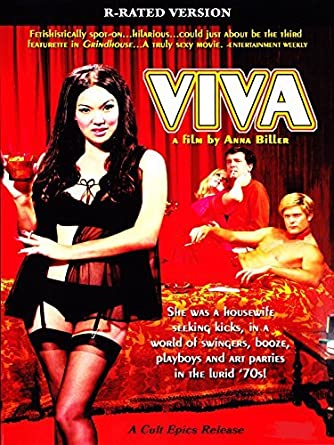 Anna Biller's film poster for her film 'Viva'. Anna Biller's film poster for her film 'Viva'. Do you consider your films feminist? No, no I don’t, I think that very few films are feminist, I think that politics is something that doesn’t often enter into entertainment films. What I’ll say is that my films are feminine on purpose, they're from a female point of view. You don’t get a female point of view from just being a woman, you get a female point of view by consciously being very specific and honest with yourself about how your thinking might be different from that of men. How your experiences might have been different from that of men, and then trying to create characters and situations and stories around that, but you have to be conscious of doing it. Most people just copy other people’s writing. Most of the movies and culture are made by men and most people copy other people’s work and most people including men aren’t really that self reflective and introspective in their writing. I’m not saying that’s a bad thing, I’m just saying it’s a different way of working. I have a consciously female way of writing. Is that feminist? That’s up for interpretation. It is consciously differentiation itself from a masculine way of thinking. A question from Amelie from Chicago - do you have any advice for first time directors? Make sure that when you’re making something, you're making something that you really want to make. That you really like and that you’re willing to live with for many many years. Make sure you really prepare, think about what you’re doing, why you’re doing it, and who it’s for. Mostly for yourself, but also try to find a universal thing so that other people can relate. Think about who your audience is, and if you love what you’re doing, then other people are going to love it too. 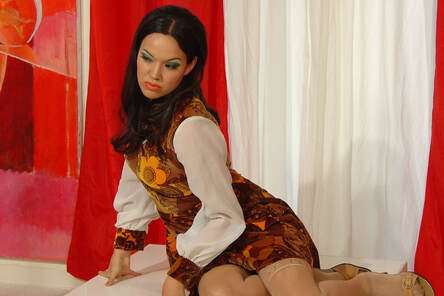 Anna Biller in her film 'Viva'. Anna Biller in her film 'Viva'. You played a role in your self-made film Viva, what impacted your decision to not also play a role in the love witch? To be honest, that was a terribly difficult thing to do, to be in front of and behind the camera. I did it on the short films and it wasn’t that hard because they were just a weekend here and there but then doing it in a feature was terrible. Part of it was that I couldn’t really move the camera, we didn’t even have play back, I didn’t want to have this huge surprise of what it was going to look like when I got the footage back. I’ve had DP’s move the camera in ways that were really offensive to me in the past. I tend to not let the DP move the camera, I don’t have camera movement and that was kind of obnoxious. I had some dolly shots when I wasn’t in the shot, but it was really hard. It was also hard to go back and forth between the mode of acting and directing. I had to really blank myself out when I was acting, but I didn’t have the internal space to prepare for the character, so I felt like it really hurt the performance. It would have been so much better if someone had just been dedicated to performing. It was terrible being in the makeup chair while I should have been directing. I’d be in a different room and I would come back and it would be all wrong, the camera would be in the wrong place and the setup would be wrong, and they wouldn’t have followed my storyboard, and they'd have to relight it. I need to be out there by the camera at all times not in the makeup room, and then the makeup artist refused to do my makeup on set. He said “no because you’re moving your face too much and you're moving your mouth too much, you’re talking your looking” and I had to be still. The other reason is I didn't enjoy performing as much after that. I felt very objectified, I objectified myself as an experiment and I just didn’t like it. I didn’t like having the camera on me. I want this kind of image of female beauty and I don’t think I fulfill it. When I was doing it as an experiment in an art film it was more about the discrepancy between my own image and what I was aspiring to be, and then I didn’t want that discrepancy anymore, I just wanted to pick a really gorgeous woman, where there wouldn’t be any issues with the looks. Can you talk a little bit about your new film Bluebeard? I’m so excited about Bluebeard. I had a lot of problems about getting it off the ground, I’ve been working really hard on it, it’s just a new territory for me, doing a film through a studio or through regular financing channels and I’ve never experienced it - even though I have a really good agent, I have problems navigating that world. I had it set up and then the places fell through, and then finally I had it set up in a new place where it really seemed like it was just about to go, and then the pandemic hit. Now nobody can film and all those independent companies are going under, and they’ll probably be gone by the time this thing ends. It’s really sad. The movie itself, I’m so excited by because The Love Witch was kind of visually inspired by these 60’s pulp novels with witches on the covers, sexy witches, and then Viva was visually inspired by ads and cartoons from playboy magazine and this one is inspired by those vintage romance pulp novels with women running from castles with their hair blowing, wearing an incredible night gown or a beautiful dress, very gothic. It’s just hyper hyper gothic. I was mainly inspired by these old Hollywood movies like Gaslight, Suspicion, and Rebecca, and all these movies where there’s a scary husband and you don’t know if he’s trying to kill you or the love of your life. Those are some of my favorite movies, so I wanted to emulate that through the Bluebeard fairy tale. The Bluebeard fairy tale is the archetypal fairy tale that your husband wants to kill you. Those classic movies about that are called Bluebeard movies. The whole gothic romance concept comes from Bluebeard stories. A dangerous man, you know wuthering heights, in a castle, you find him very hot and sexy yet you’re afraid of him. It’s a metaphor for any type of dating, relationship, or marriage, where you never know whether the man is safe or not. You can be sucked into falling madly in love and marrying someone and having their babies before you realize that they’re a psycho killer. You think about horror, and they always say draw on your worst fears, I think for many women that is their worst fear, to fall madly in love with a psycho. You’re giving them your life, your love, your feelings, and your time and get so involved that you can’t get out. For straight women I guess. What route do you plan on going with Bluebeard one it’s done? Do you plan on putting it in festivals? How did the pandemic affect your decision on this film? I think this should go straight to Cannes, that’s my dream. I’m going to skip past Sundance this time, even though I’ve never actually gotten into Sundance. It’s such a European type of film, it’s such a British film. I would definitely like to do festivals and hope for some kind of theatrical release, because it has the potential to be kind of a cult film, because so many women are interested in these themes and I’m planning to make it a very beautiful type of color. The issue with the pandemic is that I can’t shoot, or even finance or cast right now. In the meantime I’ve written another script, and I might then write another script, depending on how long this goes on. These scripts are cheaper than Bluebeard and might be easier to finance and so Bluebeard might not be the next one I do. Everyone has less money now to invest in movies, so that’s one reason why I’m writing cheaper things. I’m really hoping I can make Bluebeard next but it might not be the next one. 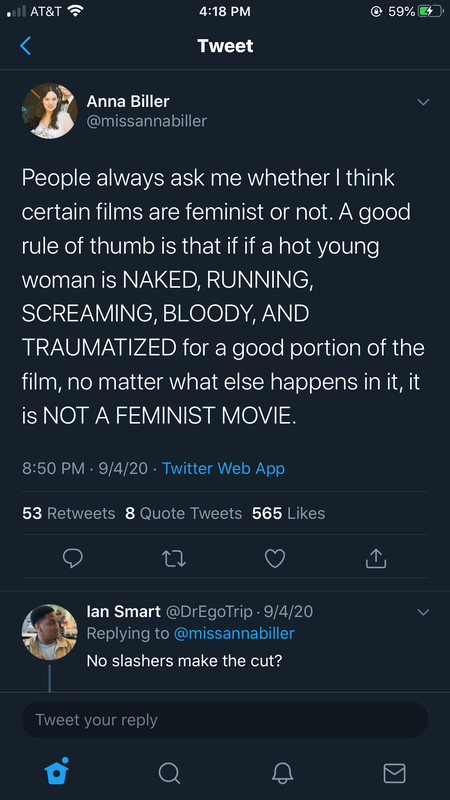 Anna Biller's tweet about slasher films. Anna Biller's tweet about slasher films. You tweeted something about how naked bloody women screaming in horror films is not feminist horror, would you ever make a slasher film where this wasn’t the case and how would you change these stereotypes in the horror genre? That’s one thing I was kind of interested in doing with Bluebeard and this other horror film that I just wrote, is this idea that you can have a horror film and you can have women getting killed and you9 can have it be a slasher but it’s not from the killer’s point of view. The old --- movies were never from the killer’s point of view, it wasn’t until 1960 that you ever had a movie from the killer’s point of view. Psycho and Peeping Tom both came out in 1960, and they were the first movies that did that, and ever since then, most slasher movies are from the killers point of view. So what I’m trying to do with Bluebeard and this other medieval horror movie that I just wrote and whatever slasher movies I may write, is I want to take it back to the female point of view. You’re in the victim’s point of view. In the female's point of view, the ten discarded female bodies before the final girl survives; you couldn’t have that because each one would be too sad. You can’t just throw away female bodies like that, it doesn’t matter if there’s a final girl at the end. If you’re doing it from a female point of view, you can't just discard that many women, maybe one or two women could die, but they would have to be tragic. In filmmaking, you want to create a feeling. I feel like filmmakers always try to create the most extreme feelings in the audience by having the killing be more extreme, the violence be more extreme, but if you want to elicit more emotions from an audience, create a character that people care about, that will elicit strong feelings. If you feel like you know that person and that person dies, that’s going to give you more feeling than if the gore is just a little more fancy. It’s the idea of making a more effective horror movie. The reason Psycho is more famous than almost every slasher movie is because of how expertly the characters are drawn. It wasn’t about the gore, it was in black and white, you couldn't even see the gore that much. It’s not about the thrill of the shower scene, it’s not about the sexualized violence, the majority of people who tried to copy psycho, get it wrong. They’re copying the things in Psycho that aren’t the things that make it great. The important thing that Hitchcock always did, even in the thirties and the twenties, was have great characters and create empathy,pathos, humor, good, writing, and good editing. That’s what makes it an effective movie. Is Hitchcock one of your inspirations? More and more so, the more I study him! He’s kind of incredible because even in the 30’s he was doing really sophisticated stuff with the relationship between men and women. Between married couples and his understanding of both male and female psychology surrounding relationships and love was very deep. I think the writers in a lot of the early thirties and forties movies were women, but a lot of the male writers and directors learned how to be extremely empathetic to women as well because women were really driving the box office so there was a need to create great female characters. Once the censorship codes exploded and the new Hollywood aesthetic kicked in, everything has been about men ever since. This has been 50 years now. Not that I’d like to go back in time, but we can go forward in the future with having great female characters. Both of your parents were in art and design fields and you do design all of your sets; do they have inspiration in that? Do you think you would still be doing it if they weren’t in those fields? Probably not. One thing about growing up with artists, you tend to learn about life through your parents and what is possible. I saw them making stuff all the time, like my mom made these beautiful dresses, she was always the best dressed and had the most incredible clothes and all of her friends were wearing her clothes that she designed. So everyone was wearing her clothes. We didn't have any money, we were poor, but she had the best clothes. My dad too, he just made everything, swing sets and bunk beds, and we never bought anything. We didn’t ever have a bed that we bought, it was a slab of foam rubber on a board and cinder blocks, everything was sort of weird. It wasn’t ever about money, it was just about making stuff, so I just grew up with the mentality that if you want something you have to make it. I guess that was really ingrained in me. After I went to UCLA, I went into the art department there, I went to New York and I worked in photo studios. I happened to get this job as a photo assistant, I was assistant to the stylist and I helped her create sets. They were shooting wallpaper catalogues, so we had to create rooms. Just a little corner of a room and it was super hoaky because it would be this wallpaper and it would match the fabric of the couch and it was amazing to me because it would remind me of those little technicolor movies where everything would match. I learned how easy it is to fake wallpaper, a few pieces of wood, fake upholster a couch, fake do this and fake do that. I would lug the extra rolls of wallpaper and extra bolts of fabric home on the subway and I would create these little sets in my basement apartment, and I started making super eight movies. I would make this Victorian dress for some girl in front of the wall, and that’s how I started making movies. I would drag furniture from the street, and it was like a railroad apartment, it was 7 feet wide, it was super long, like 40 feet long so when you get the camera back. Very weird. How old were you when you started making films? I started making videos before that. When I was at UCLA in the art department I started making videos when I was about 19 or 20. Another question from Amelie from Chicago - how many rewrites did you do for The Love Witch? So many that I can’t even count them. They wouldn’t necessarily be full rewrites, I would change some of the dialogue in one scene and I’d save it as a new job and I’d tweak a little bit more. I didn’t really completely change it, I just kept tweaking it for years. By the time I was done with it, it was quite different from when I started, but I didn’t actually ever do a full rewrite. I was teaching myself how to write. I didn’t really know how to write, because Viva was kind of a weird script. I wanted to write a conventional script and for some reason it was very hard for me to do that whale also keeping my themes in the front like I wanted, and keeping the visuals like I wanted. I didn’t think that way. I thought in terms of sets and visuals, in scenarios and taboos, I didn't think in terms of a script so it really took me a while. Now I love writing, my new scripts are better and better because I know what I’m doing a little bit. [In the Love Witch] When Elaine is taking off her clothes for the first man and it starts getting really colorful like a kaleidoscope, did you use a lens for that or was that post-production?
It was a lens, but here’s this company named Koken, and in the 70’s they made all of these filters, and they were super psychedelic. The filter made something like that lens. You rotate the lens, it’s a rainbow filter. It creates rainbows whenever there are lights, so it created rainbows for the chandelier and the candles and any lights that you would see. All the effects are in camera. Is that how Bluebeard’s going to be? Just strictly in camera effects instead of post-production? I’d really prefer it. When you’re trying to emulate a period look, that’s one of the main things that makes it look period, if you do your effect in camera. You don’t do CGI. It doesn’t have the same depth. Jurassic Park is so impressive the way the dinosaurs look, but they don’t have the depth of a Ray Harry Housand movie. Like those claymation sort of monsters and they look so 3D, so real even though the movements are kind of jerky. They’re kind of scarier because they are really in the space. What’s one major goal or dream as a filmmaker that you want to achieve in the future? I want to make my fricken Bluebeard movie. I want to make that and then I want to make more movies. It’s just my dream, my dream is to keep going. To get financed and to keep going, and to get distributed, that would be amazing. So that more people see it. |
AuthorBridget Johnson is the president and co-founder of Dare to Dream Productions. She writes and directs thought-provoking films that inspire others to follow their dreams. Archives
March 2021
Categories and authors
All
|
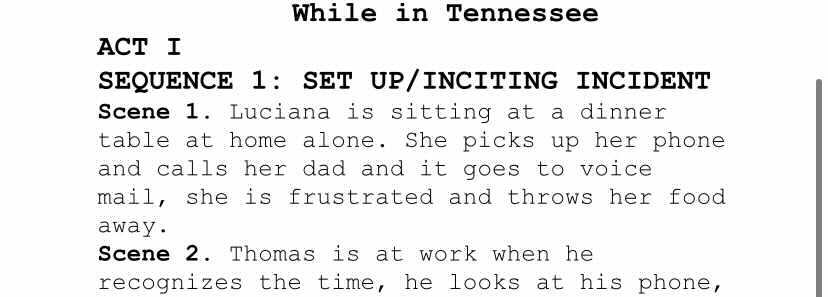
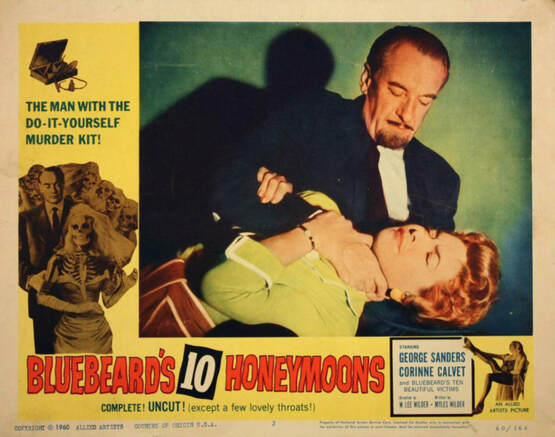
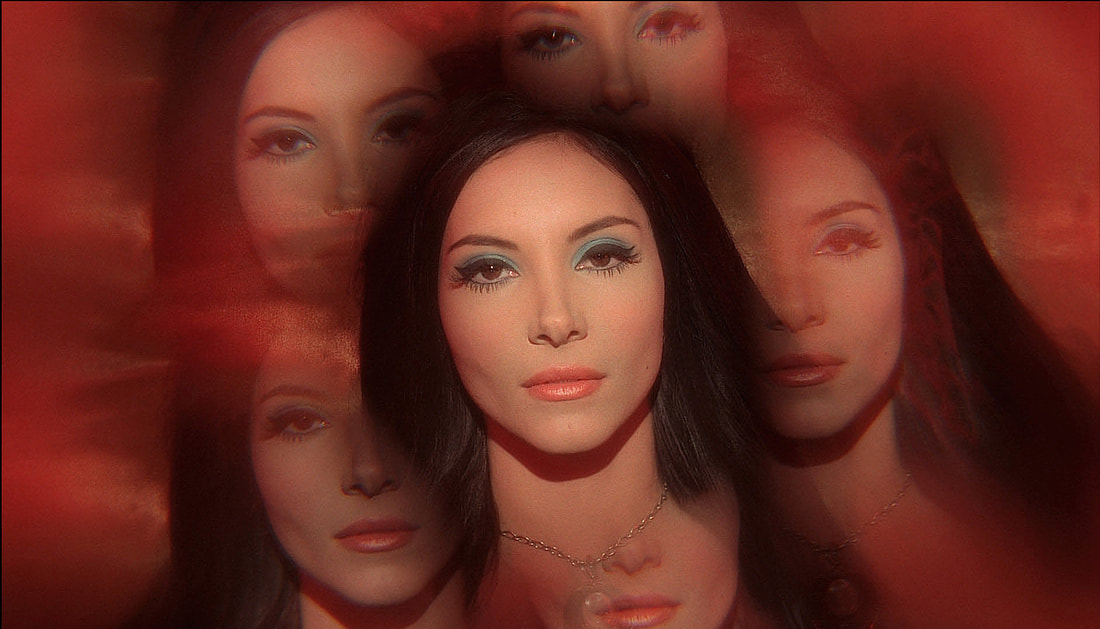
 RSS Feed
RSS Feed